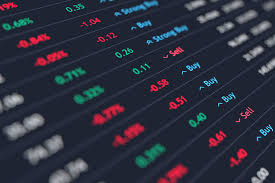Equity futures slide on nerves over retail-trading frenzy

European and U.S. stock futures fell on Friday, while Asian equities headed for their steepest weekly loss in months, as a Wall Street retail-trading frenzy and a liquidity squeeze in China unnerved investors and weighed on frothy markets.
S&P 500 futures fell 1.2% and Nasdaq 100 futures fell 1.4%. FTSE futures, DAX futures and EuroSTOXX 50 futures all fell by just over 1%. The U.S. dollar rose to a seven-week high against the yen.
MSCI’s broadest index of Asia-Pacific shares outside Japan fell 0.5% and is on course for a weekly loss of 3.8% – which would be the largest since September. Japan’s Nikkei fell 1.5% and is heading for its first weekly loss of the year.
“I’m definitely seeing the nerves,” said Chris Weston, head of research at Melbourne broker Pepperstone.
“There’s a knock-on effect that happens from targeting hedge funds, and this could have legs … people are unsure how this social media movement plays into greater financial markets.”
Wall Street has been gripped by a coordinated assault by small traders organising over online forums, such as Reddit, to force hedge-funds to reverse short positions – or bets that stocks would fall.
They lost some of their firepower overnight when brokers cut off borrowing facilities and restricted trading in some of the hottest names, such as GameStop and BlackBerry.
The boss of popular online broker Robinhood said the curbs were deployed to protect the brokerage and its customers but that some restrictions will be lifted on Friday.
“Robinhood relented. The mob is back in,” said Bank of Singapore foreign exchange analyst Moh Siong Sim, with stocks the focus for currency traders as equity moves drive sentiment.
“The price action over the past week has been strange,” he said, (which) speaks of forced position shakeouts rather than being driven by fundamentals.”
The nervousness drove some buying into the U.S. dollar, although apart from making a fresh high for the year of 104.57 yen, it kept within recent ranges against other major currencies.
It rose about 0.5% against the risk-sensitive Australian dollar and 0.6% against the Norwegian krone.
SQUEEZE
Adding to nerves, the shake up in equity markets comes as COVID-19 vaccine rollouts have run into trouble and as global economic data starts to look less rosy.
Investors were impressed by a smaller-than-expected rise in U.S. weekly jobless claims on Thursday. But they still rose by more than 840,000 and data showed the U.S. economy contracted last year at its sharpest pace since World War Two.
Vaccine production delays have also snowballed into a spat between the European Union and drugmakers over how best to direct limited supplies.
Meanwhile, the People’s Bank of China (PBOC) injected 100 billion yuan into the financial system on Friday, following a week of reducing liquidity, which had sparked concerns the central bank was in fact tightening monetary policy.
Still, the extra money did little to loosen short-term money markets, where rates rose for a fifth straight day and benchmark overnight repo rates surged to their highest in nearly six years.
“The size was not sufficient to fill the liquidity gap across the Chinese New Year and it is too early to conclude the end of liquidity squeeze for now,” said Mizuho’s chief Asian FX strategist Ken Cheung, referring to Lunar New Year holidays in coming weeks.
The yuan slipped 0.2% to 6.4627 per dollar. The Hang Seng Index and the Shanghai Composite eked small gains on Friday, however both are on course for weekly losses of more than 2.5%.
The yield on benchmark 10-year U.S. Treasuries rose overnight and held at 1.0483% on Friday. Gold sat at $1,842 an ounce and oil prices were steady, with stalled vaccine rollouts capping upward momentum.
Brent crude futures were last flat at $55.52 a barrel and U.S. crude futures slipped 0.3% to $52.18 a barrel.










